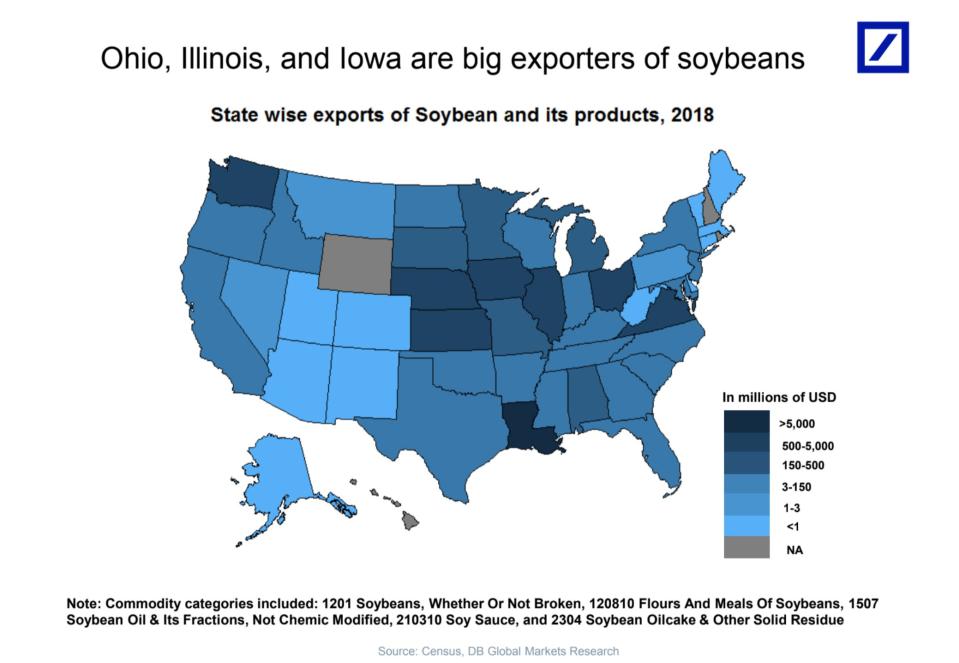'We’re pretty helpless': American farmers react to China's latest trade war play
China is a massive customer of American agricultural products, and soybeans in particular are a key lever in the ongoing trade war.
Beijing basically stopped importing U.S. soybeans in 2018 and promised to ramp purchases in 2019 as negotiations moved forward in early 2019. But China has now reportedly put a hold on buying U.S. soybeans as talks sour, and the pain is being felt once again in the U.S. heartland.
“We’re pretty helpless out here,” Glenn Brunkow, a Kansas-based farmer who grows corn and soybeans, told Yahoo Finance. “We just hope that this will resolve in the near future and it will benefit the U.S. and some of the trade imbalances. We’re cautiously optimistic but … our patience is running thin.”
Brunkow, who described the hold as “not good” but also “not unexpected,” added that he “assumed there would be retaliation. I was just waiting for the other shoe to drop.”

‘Farm income is at the lowest level it’s been in years’
After trade talks had resumed between the U.S. and China in March, the relationship between the two countries showed significant signs of improvement in April. China imported 1.75 million tons of U.S. soybeans, which was a 15.9% increase from March. But breakdowns in talks in May brought another stalemate.
“I just feel like it’s another piece of the puzzle they have to work through,” Lorenda Overman, a North Carolina-based farmer who grows soybeans, corn, and wheat, told Yahoo Finance. “I feel like China’s posturing. Eventually, they’re going to have to have some soybeans and I think they’ll come around.”
Brunkow noted that this is something “we have no control over.”
“In a normal year, you might position yourself to protect yourself price-wise,” he said. “But with this trade war that’s been ongoing for a couple of years now, there really isn’t anything we can do. We just have to watch it out and remain optimistic.”

He noted the effect that the trade war has had on profits for him and his fellow farmers.
“Farm income is at the lowest level it’s been in years,” Brunkow said. “It’s had a tremendous impact on us.”
Last month, Bloomberg reported that “personal income for farmers fell by the most in three years in the first quarter.” This is largely due to the agricultural losses from the trade war.
“All of my neighbors have been impacted — anyone who grows soybeans,” Brunkow said. “You can even take that down Main Street in our towns — implement dealerships, car dealerships. We’ve cut back on purchasing and repairing things. And so, it’s had an impact all the way down the line in rural America.”
And although the USDA announced last week that it will be providing $16 billion to help American farmers affected by tariffs in the U.S.-China trade war — after previous aid totaling $7.7 billion — that might not be enough.
“It’s hard to say” whether or not the aid will hold them over, Brunkow said. “I think I speak for all the other farmers I know that we appreciate the aid and it will help, but we would much rather rely on free trade in the market.”

‘Some of the worst weather I’ve ever seen’
On top of all these trade tensions causing stress on the agriculture industry, other factors like the weather have made things worse.
“The news that Chinese buyers have completely left the U.S. market is just one more piece of bad news for farmers struggling with delayed planting and flood waters covering much of Missouri,” Missouri Farm Bureau President Blake Hurst told Yahoo Finance in a statement.
The last few months have seen devastating flooding throughout the Midwest, particularly in March. Kelly Brunkhorst of the Nebraska Corn Board recently told NPR she was estimating about $440 million in crop damage from the rain due to “unplanted crops, late planting,” and other effects.
“We’re in the middle of some of the worst weather I’ve ever seen,” Brunkow said. “I haven’t gotten any soybeans planted and I should be done planting soybeans. In fact, I’m out there planting corn and that should have been done over a month ago. So, if we don’t get the crop in the ground, it doesn’t really matter.”
With severe crop devastation caused by extreme weather, Trump’s tariffs could either be the final nail in the coffin for American farmers or just another brutal hiccup.

‘We knew it was going to be painful’
As more time passes, the pain for American farmers becomes more acute.
“Times are getting critical, but farmers are used to weathering storms,” Overman said. “I think farmers realize their president supports them because of the tariff relief packages he’s passing to try to compensate a little bit.”
She continued: “Because of that vote of confidence the president puts behind farmers, that makes them feel like he’s on their side. I feel like they’re willing to support him and what he’s doing for the greater cause. We took it on the chin a long time with our prices. I feel like he’s going to try to equalize this trade.”
Brunkow agreed, though that doesn’t make the reality any less grim.
“We knew it was going to be painful,” Brunkow added. “I’m not sure we knew it was going to be this painful, that the fight was going to take this long. But I think right now, we’re all committed to stay the course.”
Adriana is an associate editor for Yahoo Finance. Follow her on Twitter @adrianambells.
READ MORE:
'Is this sustainable?’: Farmers say bailouts aren’t enough in Trump’s trade war
American farmer on China trade tensions: 'We need to take a stand now'
Read the latest financial and business news from Yahoo Finance
Follow Yahoo Finance on Twitter, Facebook, Instagram, Flipboard, SmartNews, LinkedIn, YouTube, and reddit.

